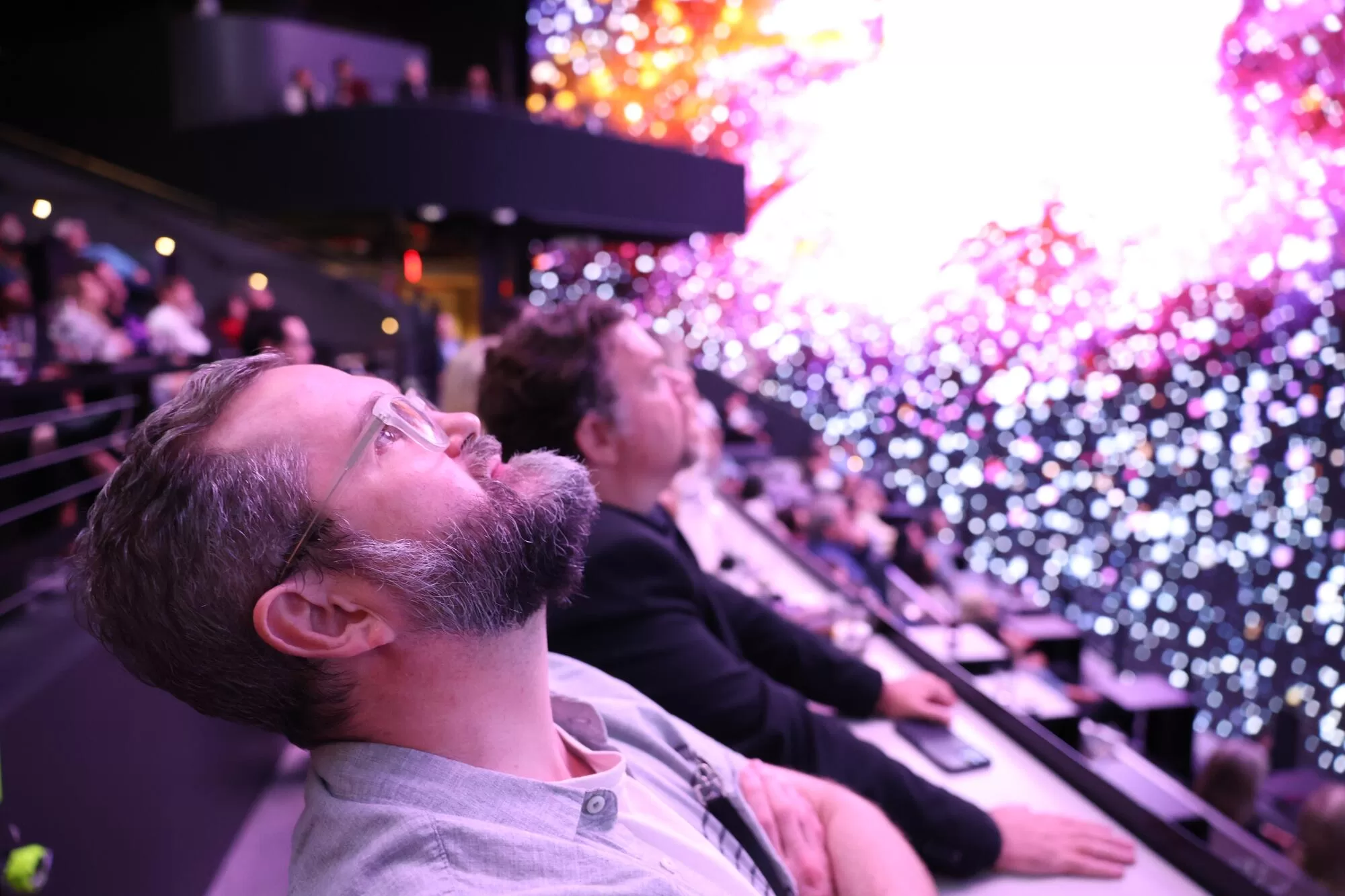Outside it was sunny and in the high 80s, but inside, a large, spectral-like glacier was rushing toward me.
As it broke apart in the water, it looked sickly, with glowing green streaks running through it. Then it was overhead, and I was spiraling, traversing oceanic crests only to arrive inside an underwater forest.
I was at Cosm in Inglewood. And I was watching a short film, “Seek,” from local artist Nancy Baker Cahill. As images of leaves and algae swirled below, in front and above us, some audience members gasped. Others pointed at mystical details in the fantastical take on nature.
Cosm, which officially opened this month, is an entertainment- and sports-focused venue that places guests in a mini-arena with a screen that surrounds them. It’s L.A.’s latest entry in the still-burgeoning immersive space, one that taps into our long-held desire to be enveloped in panoramic visions, this one a large-scale display that towers in a dome.
While “Seek” is otherworldly, much of Cosm’s programming aims to be grounded in reality. Thus far, it has focused on live simulcasts of sporting events. But don’t think of it as a sports bar. And don’t necessarily consider it a theater, either, although its current programming includes a Cirque cu Soleil favorite. Here are seven things to know about the hard-to-pigeonhole Cosm.
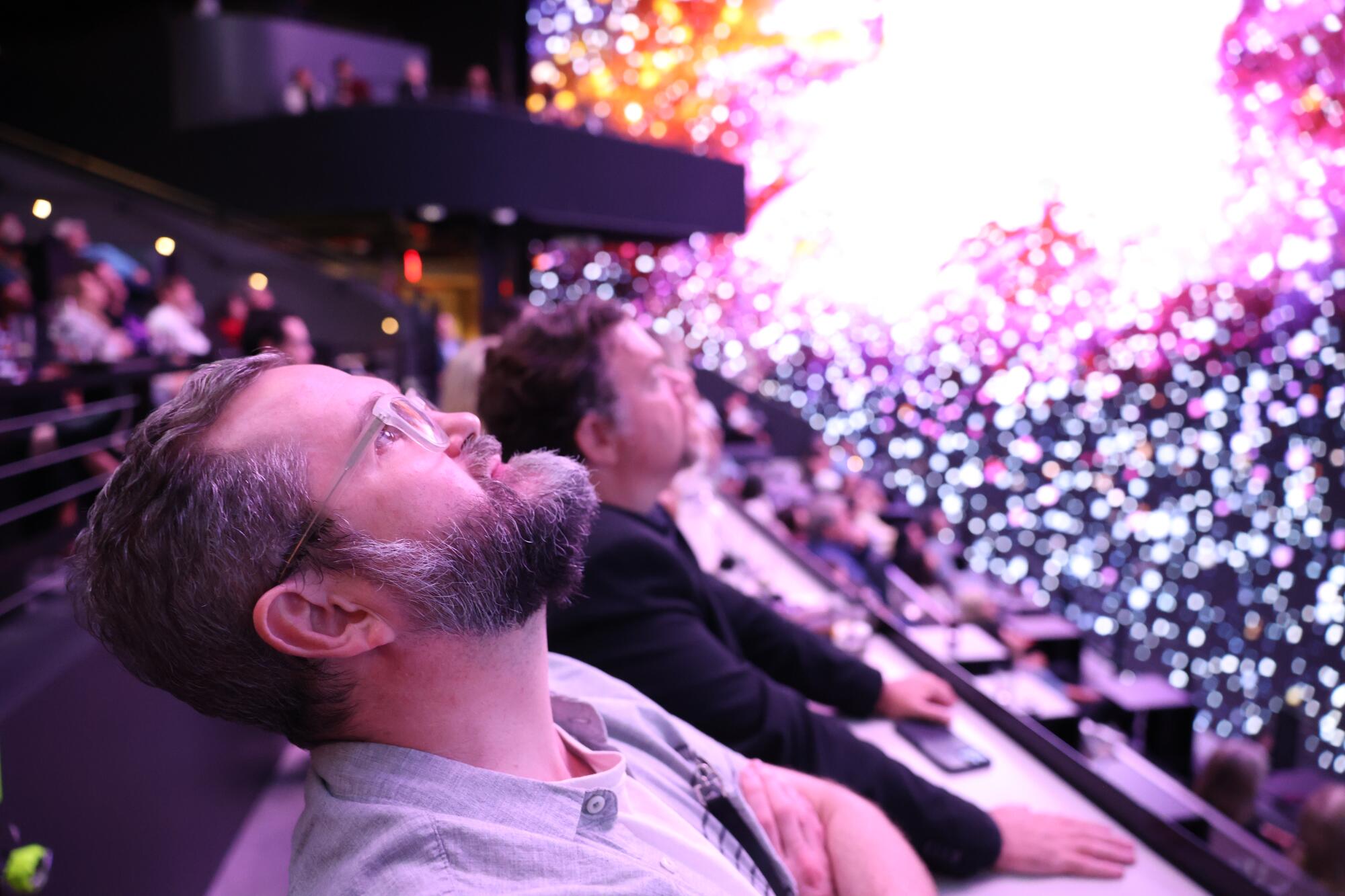
Cosm aims to envelope guests with a wrap-around screen. The venue will focus heavily on sporting events and short, artist-commissioned works.
(Michael Blackshire / Los Angeles Times)
Courtesy of Cosm and Nancy Baker Cahill
1. Think of it as part planetarium, part mini-Sphere
Cosm has roots in science and education. The firm owns Spitz Inc., the planetarium endeavor founded in the 1940s by Armand Spitz, a principal in the field. Yet Cosm Los Angeles definitely has entertainment on its mind. It will no doubt recall Las Vegas’ all-encompassing arena Sphere. Yet Cosm is cozier.
The centerpiece of the venue is its dome, with an 87-foot-diameter wraparound LED screen; Sphere, meanwhile, reaches heights of about 366 feet. But what matters more than sheer numbers is the feel of the environment. If Sphere has centered itself primarily around live music, Cosm is going for an intimate, slightly upscale mood, albeit one in which each of its three seating levels is relatively close to its screen.
That means live entertainment won’t be Cosm’s core programming. Instead, expect live simulcasts of sports, rebroadcasts of theatrical productions and original, artist-driven cinematic installations. If all goes according to plan, perhaps Cosm will host a mix of concert films and live feeds of in-demand, difficult-to-get-into shows. The idea is to complement live performances by giving us views that would be largely impossible to see in the flesh, and to do so with a screen that puts us in the center of the scene.
The resolution, of course, is crisp, with Cosm boasting a 12K LED screen. That presentation, coupled with our close proximity to a screen that wraps around and above us, at times even results in a sense of motion. I watched Cahill’s “Seek” in Cosm’s dome, and the work is one that uses abstract visual effects to present alternately a surreal and welcoming vision of nature. As tornadoes swirled before us or Cahill’s images led us inside a tree, the venue seemed to lift with the visuals, resulting in a theme park-like feel.
“I’m really into big — big everything. I’m a maximalist,” Cahill says when discussing what drew her to Cosm. “Seek” is a commentary about our shifting climate, using tech that encircles us to create a sense of presence.
“Among the most important takeaways and opportunities that I thought about in terms of this canvas was, how could we reconnect to our animal selves?” Cahill says. “How could we really find ourselves embedded in nature by paying attention?”
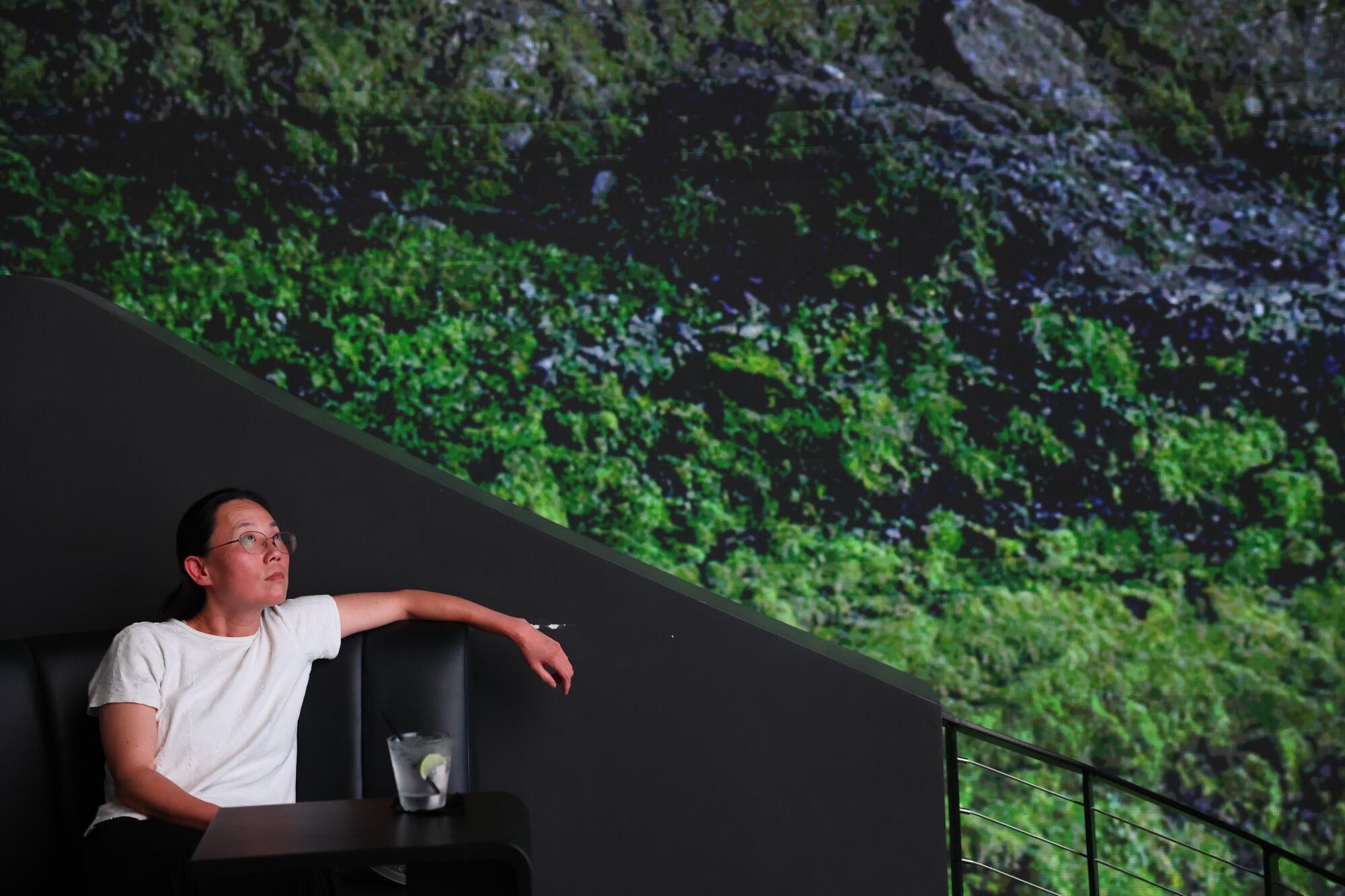
Meera Kim looks on after the “Seek” immersive show experience at Cosm.
(Michael Blackshire / Los Angeles Times)
2. Cosm wants to redefine the sports viewing experience
Situated as it is in Inglewood, nestled near SoFi Stadium and the Intuit Dome, Cosm taps into the sports-centric entertainment of the Hollywood Park area. Much of Cosm’s early programming has centered around UFC bouts, international soccer matches and, soon, the U.S. Open tennis tournament and NCAA football games. So what makes Cosm different from, say, your couch or the local sports bar? The dome, for one, isn’t simply showing a network broadcast.
Cosm events are filmed with the company’s own cameras, providing four to six unique perspectives — either on the field or courtside, or sometimes an unexpected above-ground view, says Devin Poolman, Cosm’s chief product and technology officer. The goal is to ensure what you’re seeing at Cosm is not something that is replicated at home. And if it works, it should create an illusion of being extremely close to the action, as Cosm’s in-house technical directors are switching camera angles on the fly.
Cosm will work with broadcast partners to pipe in live television commentary. Think of it all as simulating a front-row-seat experience. You won’t be tricked into believing you’re actually in the sporting venue, but it should be close. “I liken it to the days of bringing a radio to the ballpark and listening along to the announcers while you’re watching the game,” Poolman says.
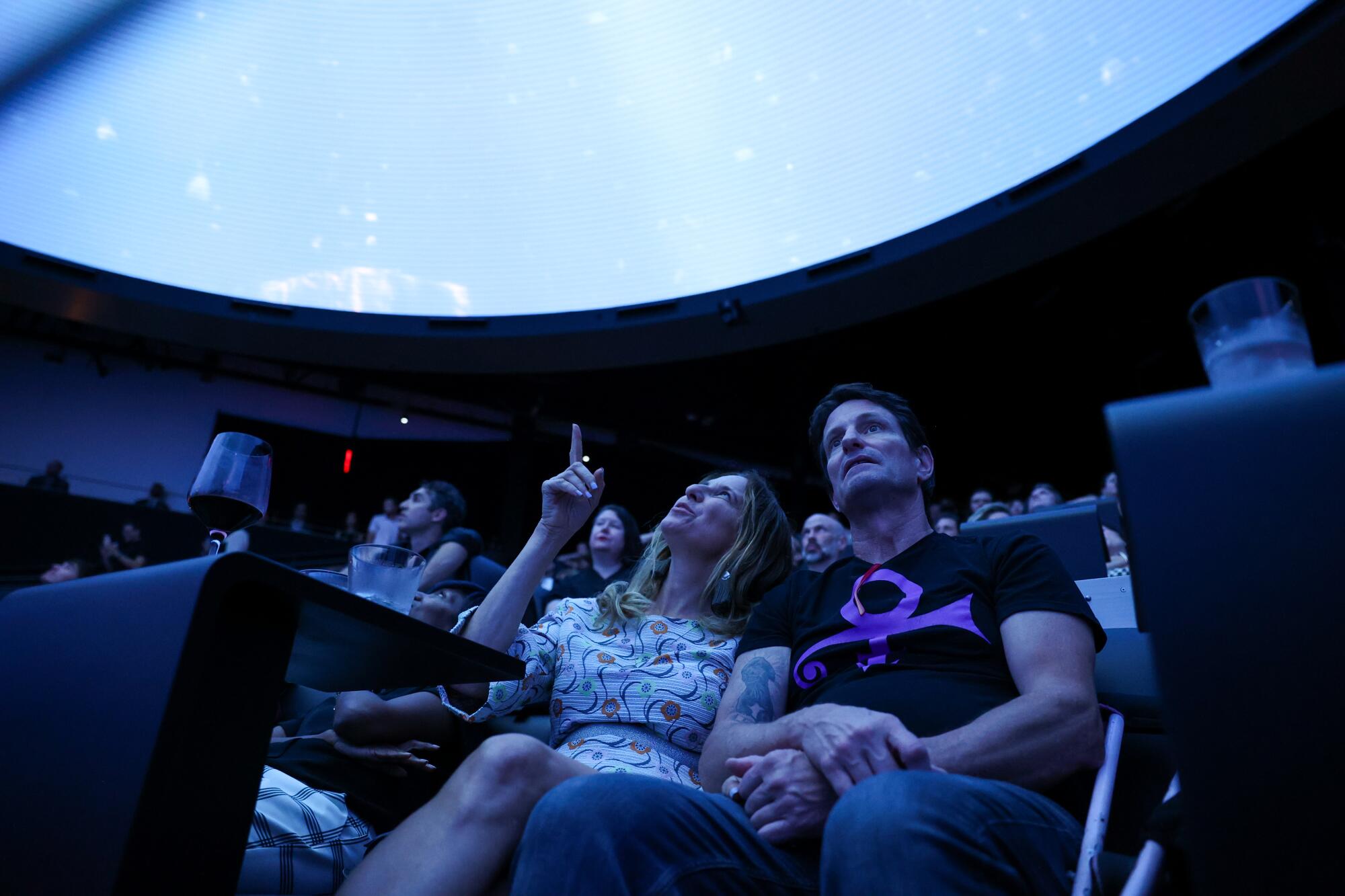
Joanne Popper, left, and James Jones experience “Seek” at Cosm, where the screen encircles guests.
(Michael Blackshire / Los Angeles Times)
3. Cosm insists this is not a theater
“We’re allergic to the term theater,” Poolman says. Cosm’s creators want the spaces to feel social. That’s why they also sell a low-priced general admission ticket, which allows access to the venue’s sports-focused bar and restaurant as well as obstructed, back-of-the-dome viewing. They want guests to know it’s OK to get up, walk around and take in the scenery.
“We want you comfortable in a social setting — going to the bar and grabbing a drink and talking to your friends while enjoying a sense of place,” Poolman says. “That is taking you to a world Nancy Baker Cahill is creating, or a soccer match or UFC fight.”
Seating, for instance, is communal. A second-floor bar rail is available for solo guests but also encourages conversation with those around you. Tables and booths offer seating for two to eight.
Cosm CEO Jeb Terry, a former pro football player, says Cosm isn’t out to show Hollywood films. Instead, the venue will continue to focus on sports and its creator program, which has largely resulted in 30- to 40-minute artist-focused, visual effects-driven works.
In addition to Cahill’s “Seek,” Cosm is home to the animated “Orbital,” from Guy Reid and Planetary Collective, an impressionistic take on the formation of the universe, and “Liquidverse: Microcosm & Macrocosm,” Ricardo Romaneiro‘s psychedelic exploration of miniature chemical reactions. All were created specifically for Cosm using primarily a mix of animation and video game engines.
“We’re not a first-run theater,” says Terry. “We’re leaning into the experiential side.”
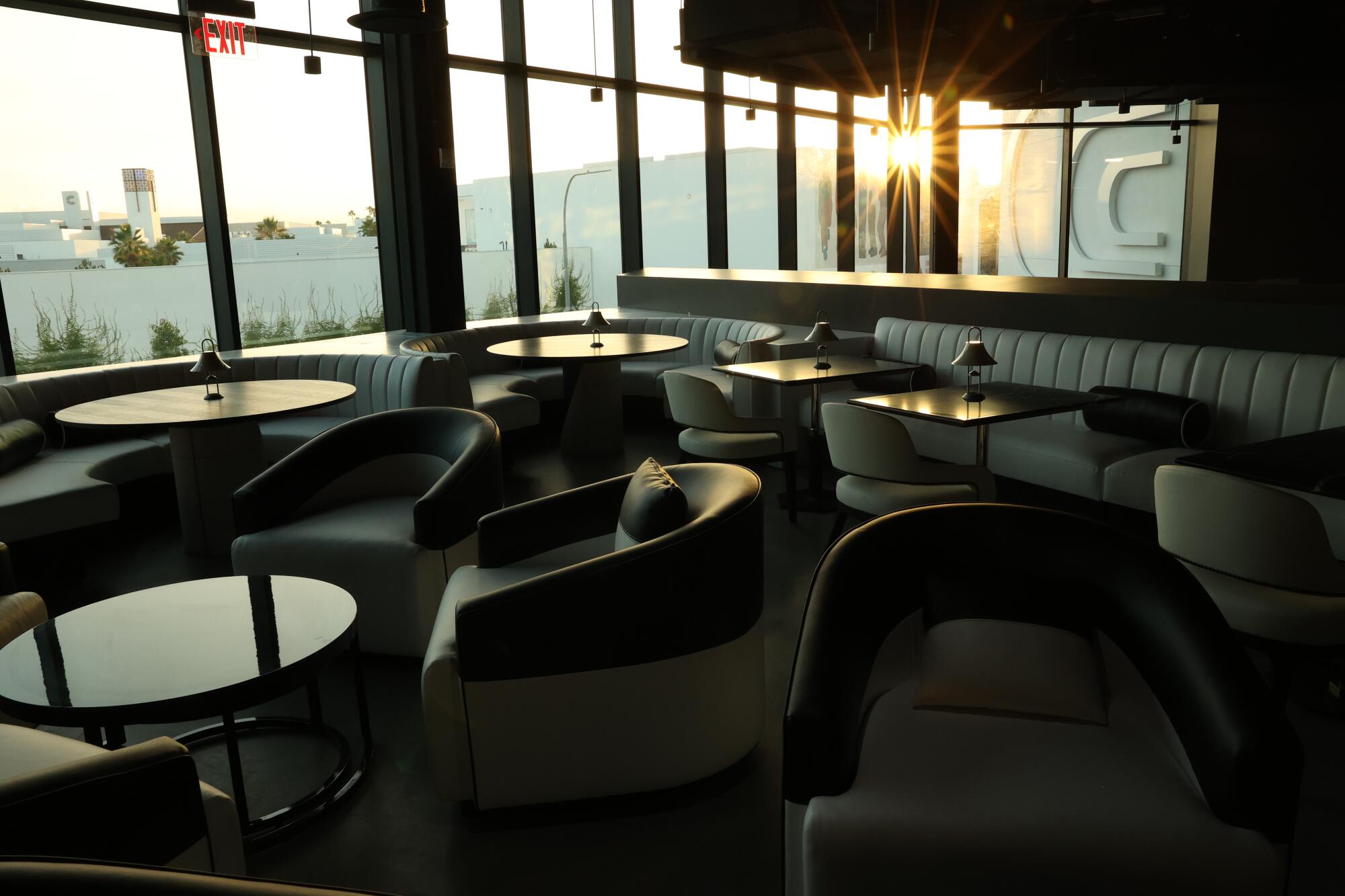
An open-air dining area at Cosm also includes a 150-foot wall-to-wall screen.
(Michael Blackshire / Los Angeles Times)
4. Beyond the dome is an open-air restaurant and bar
As someone who spends quite a bit of time at so-called immersive venues and at immersive events, I see a lot of darkened, boxy air-conditioned spaces. After a recent trip to Las Vegas to visit a number of immersive locales, shuffling among indoor spots, I spent a week working in a park, simply wanting to be outdoors. So one of the nice touches with Cosm is its first-floor, relatively open-air restaurant and bar. Dubbed “the Hall,” the area contains an indoor-outdoor bar as well as a menu of sports bar-inspired food (think burgers, wings, popcorn, etc.). Note that the kitchen is available throughout Cosm, including in the dome.
While all of Cosm requires a ticket to enter, the Hall is more budget-friendly than the dome, where tickets can push $70 per person or more. Hall tickets for the U.S. Open simulcast, for instance, cost $6, but NCAA football events run about $22. The centerpiece of the area is its 150-foot wall-to-wall digital display, which can show multiple games — the one showing in the dome, as well as whatever other key matches are happening at that time.
There are two stories, in case one doesn’t want to be looking up at the screens. It’s a nice option if whatever is screening in the dome is a blow-out. More important, though, it provides a window to the outside world, offering a necessary sensory break after being dwarfed by the dome.
5. Spend some time on the rooftop
There are three floors of dome seating, but don’t miss the escalator leading up to Cosm’s rooftop. That gives Cosm another outdoor space, this one free of screens. When all the tech becomes overwhelming, head here to have a bite and a beverage and take in the views of the nearby sporting venues. And if the scene on the first floor is too loud — depending on the game, I imagine Cosm can feel quite active — the rooftop can be a respite. After seeing “Seek,” I spent about 45 minutes up here reacclimating myself to the natural world, wishing I had brought a book.
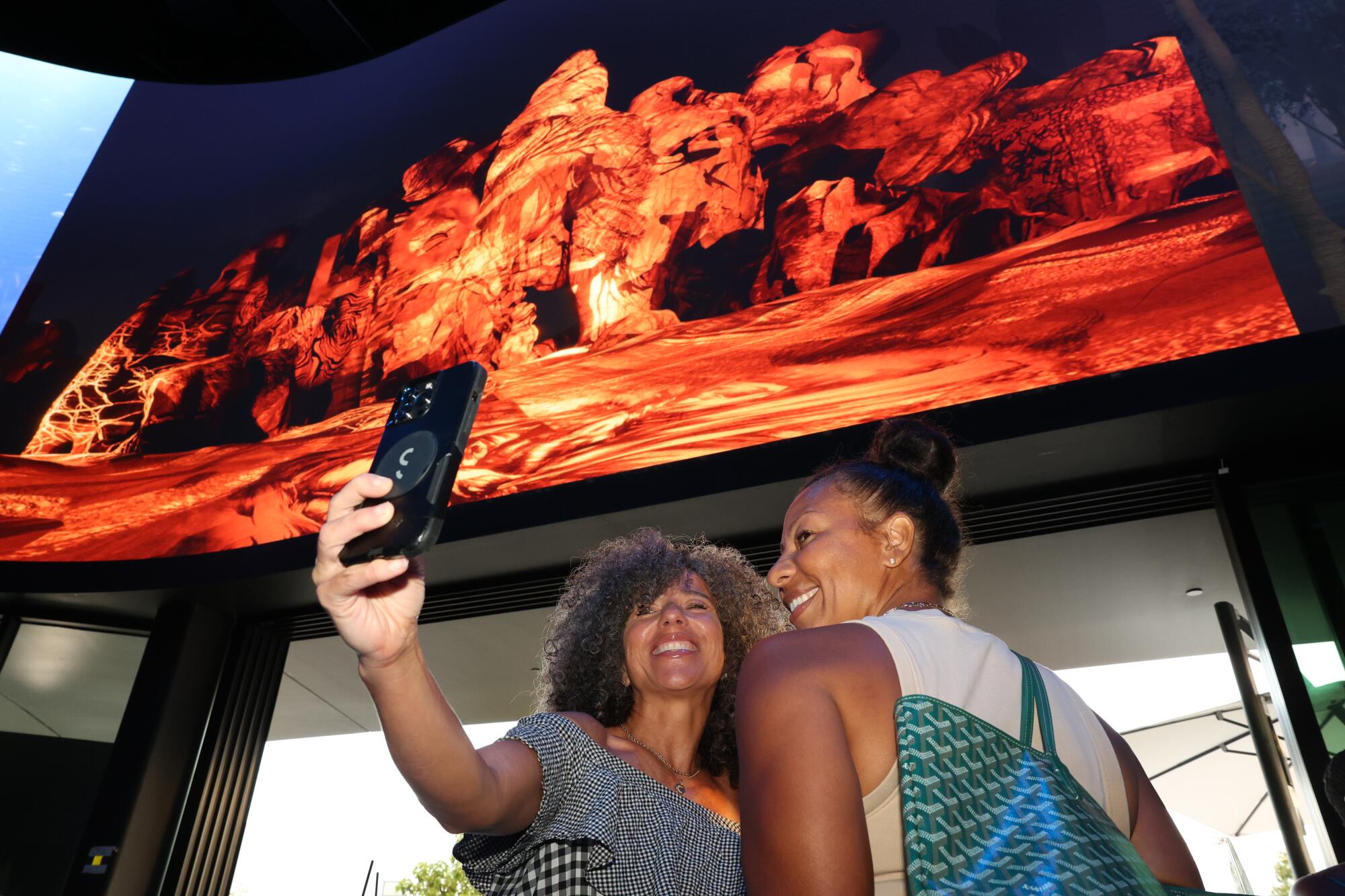
Claudine Cooper, left, and Gaynell Lyons take a selfie in the Hall at Cosm, which is a dining area with a 150-foot wall of screens above its windows.
(Michael Blackshire / Los Angeles Times)
6. Can’t make it to Cirque du Soleil’s “O” in Las Vegas? Head to Cosm
One of the more intriguing programming pieces of Cosm’s early slate is a production of Cirque du Soleil’s “O.” Single tickets start at around $77, with booths for four or five running between $264 and $385, depending on the seating level. Having recently seen “O” in Las Vegas, spending more than $150 for a less-than-desirable seat, I do wonder if the not-live but all-surrounding experience of Cosm would have been a better way to experience the show?
“There’s the opportunity to put you onstage, backstage, in the water and above the stage,” Poolman says. “We give you more than what you’d get as a fan sitting in the audience to keep you closely engaged.”
And no binoculars needed.
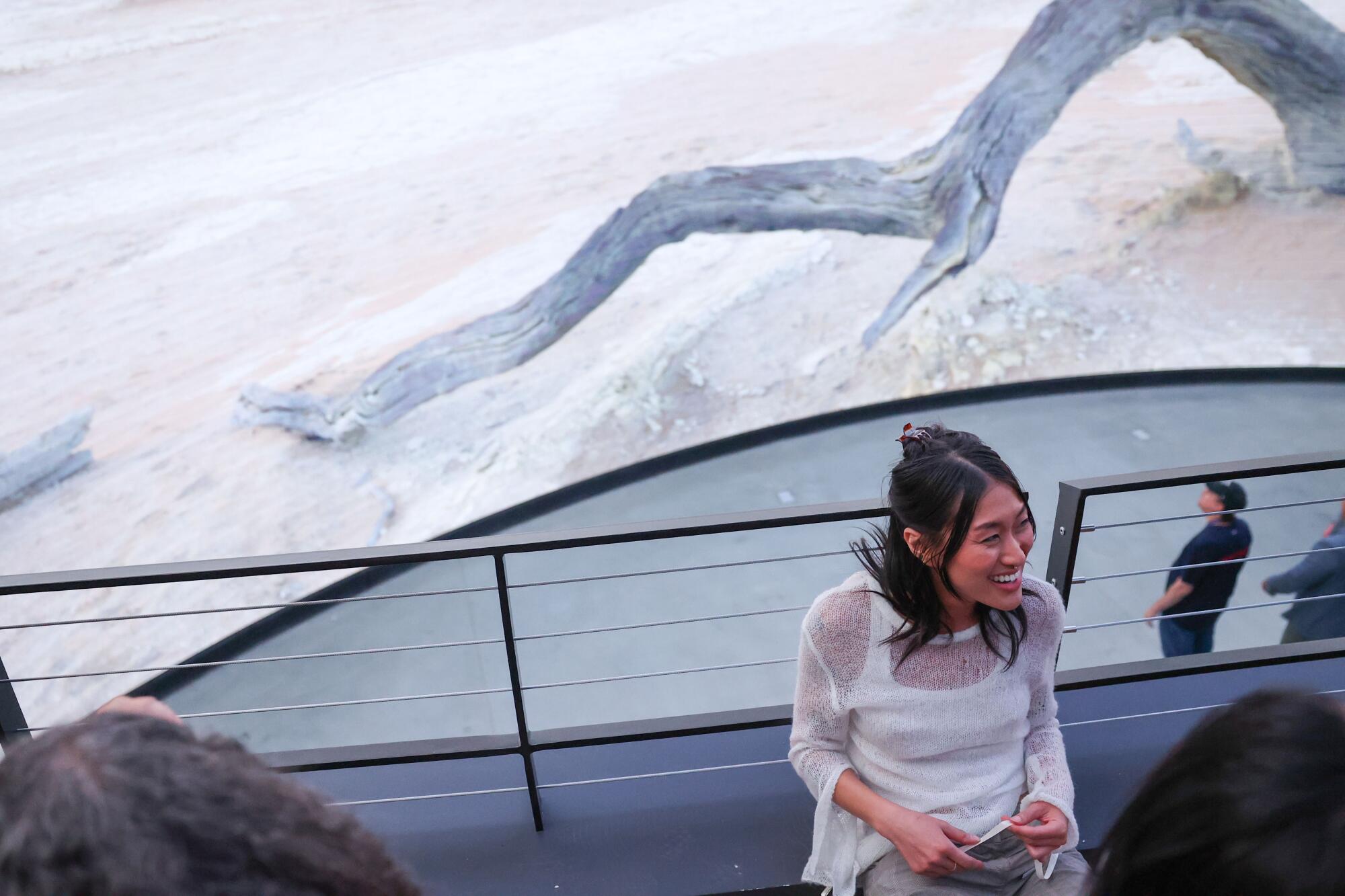
Camille Wong, center, talks to friends after a screening of the “Seek” immersive show experience at Cosm.
(Michael Blackshire / Los Angeles Times)
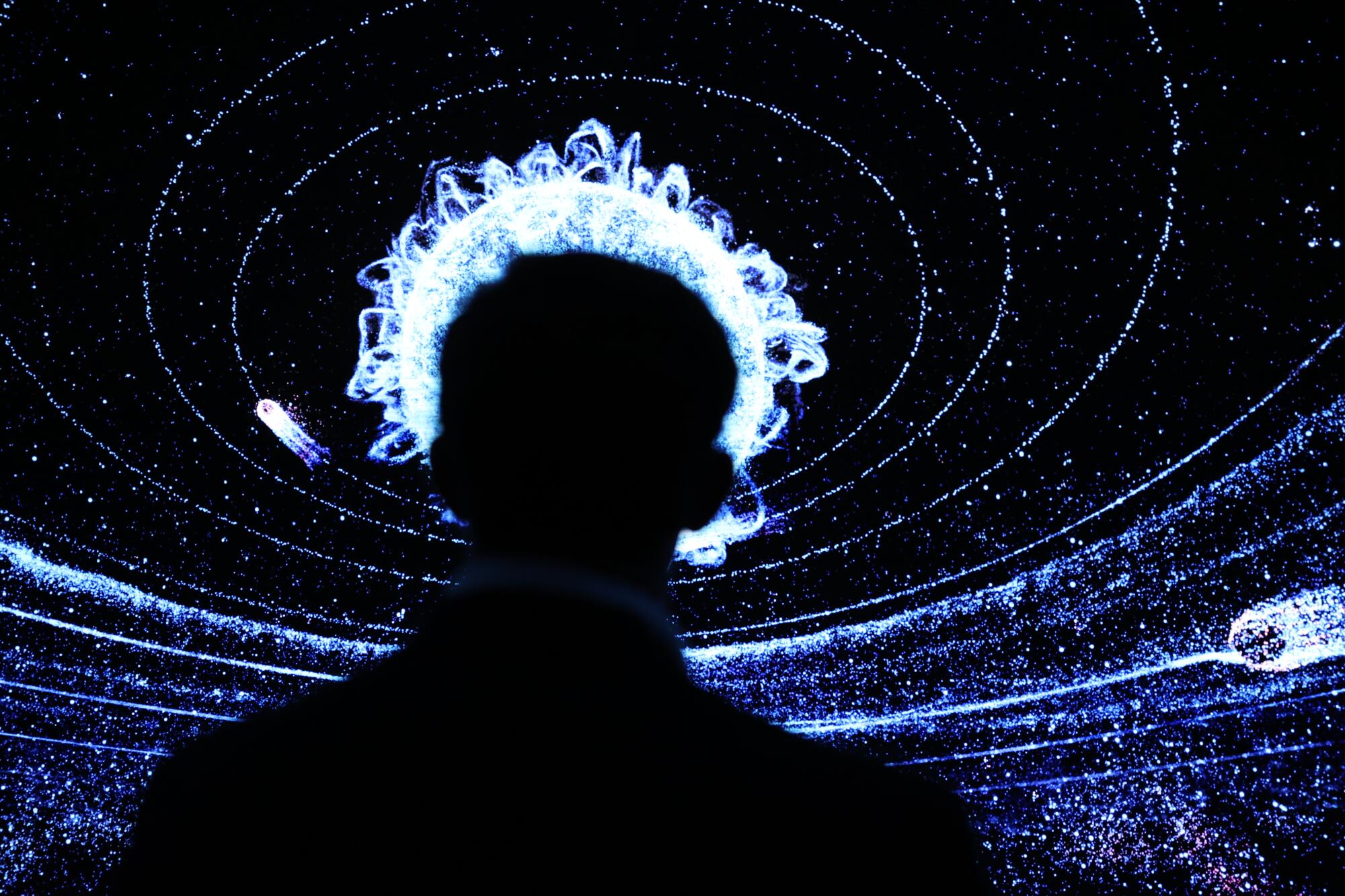
A audience member watches the “Seek” immersive show experience at Cosm.
(Michael Blackshire / Los Angeles Times)
7. Cosm is a statement about the accessibility — and affordability — of live events
The arrival of Cosm on the L.A. scene raises a question: Is live entertainment increasingly becoming unattainable to all but the wealth class?
Cosm, it should be noted, for a dome ticket isn’t cheap, even if it’s a lower cost of entry than a live event. As a tennis fan, I long to get back to New York for the U.S. Open. A single quarterfinal ticket at Cosm runs around $61 for premium viewing. A third-level table for two will set you back $88. An actual ticket to the event in New York, meanwhile, is currently $163 or more for the top deck, not including airfare and hotel.
“Some of the biggest and most sought-after events in the world are unapproachable and inaccessible to the majority of people,” says Cosm CEO Terry.
So while Cosm provides an arguably better presentation than the home viewing one, not to mention offering a sense of community, I can’t help but fear a world where there’s a growing divide between real life and immersive experiences, the latter relegating most of us to a screen-based reality. Sporting and theatrical events aren’t getting any cheaper, so this seems dangerously plausible. It’s a worry, and Cosm seems to bring us one step closer to it, especially with locations planned for Dallas and Atlanta. For now, however, I’ll see you at the U.S. Open, albeit from my seat in Inglewood.
